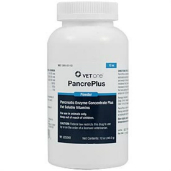Pancreatitis is not a straightforward
disease, and veterinarians are still learning a lot about it in cats.
Because of this, owners are often confused by the variety of information
available about its causes, treatment and prognosis. Keep in mind that
pancreatitis acts differently in cats versus dogs, but knowing a little
about the feline form of the disease is the first step toward managing
it.
"The most common symptoms of pancreatitis
in cats are loss of appetite and lethargy."
What Does My Cat's Pancreas Do?
The pancreas has two separate jobs:
- The production of the hormones
that regulate blood sugar levels.
- The manufacturing of enzymes
needed for digestion, which are then secreted into the intestinal tract.
It is this second role that plays the
biggest part in pancreatitis.
What Causes Pancreatitis in Cats?
Pancreatitis can develop for a number
of reasons, including:
In many cases, however, no underlying
cause for pancreatitis is ever uncovered.
The Symptoms of Pancreatitis
The most common symptoms of pancreatitis
in cats are loss of appetite and lethargy. Abdominal pain, vomiting
and diarrhea are often seen in dogs suffering from the disease but are
less typical for cats. Some cats develop a fever, but others will
have a normal or even a low body temperature.
These symptoms are not unique to pancreatitis,
so to make a definitive diagnosis a veterinarian needs to run some tests.
Routine blood work and one of two specific tests called either a FPLI
or SPEC-FPL will diagnose most cases of pancreatitis, but sometimes
other procedures such as fecal examinations, a urinalysis, x-rays, abdominal
ultrasounds and even exploratory surgery will be necessary as well.
Take note that many cases of a disease called hepatic lipidosis have
pancreatitis as an underlying cause. So if your cat has been diagnosed
with hepatic lipidosis, it should be evaluated for pancreatitis.
Veterinary and Home Treatments for Pancreatitis
Fluid therapy, pain relief, medications
to control nausea and vomiting, and antibiotics can all play a role
in treating pancreatitis. If an underlying cause can be identified,
that should be addressed as well. Cats that are vomiting should
not be offered any food, water or medications by mouth. If a cat
has not eaten for several days, nutritional support, often via a tube
inserted into the intestinal tract, may be necessary. Plasma transfusions
can also help in severe cases. Once cats are interested in eating,
they can be switched to oral pet meds and can go home for continued treatment and
monitoring.

Cats with severe pancreatic damage
can develop diabetes mellitus if they no longer are able to produce
adequate amounts of insulin or can develop pancreatic insufficiency
if their ability to manufacture digestive enzymes has been compromised.
These conditions can usually be managed with insulin and pancreatic enzyme supplements, but even with aggressive and appropriate
care, some cats do end up dying from the damage caused by pancreatitis.
The above is provided for information purposes only and should not be used for the diagnosis or treatment of any condition.
This information does not cover all possible variables, conditions, reactions, or risks relating to any topic, medication, or product and should not
be considered complete. Certain products or medications may have risks and you should always consult your local veterinarian concerning the treatment of
your pet. Any trademarks are the property of their respective owners.